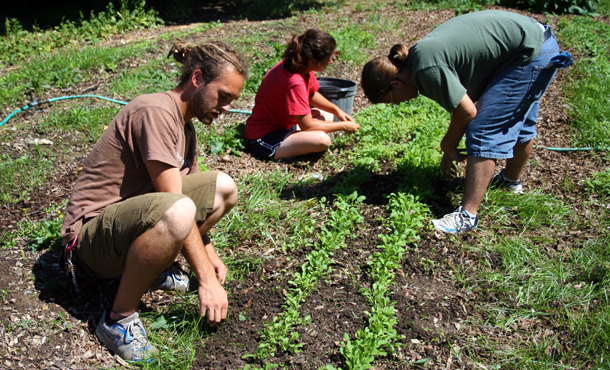In a scene that would have been familiar to the farmers’ sons and daughters who populated this campus in the early 20th century, college-aged adults can be seen planting, thinning, weeding, watering, harvesting and dispersing produce from five gardens at Eastern Mennonite University (EMU) May to September.
This summer, for the second year in a row, EMU’s vegetable gardeners are growing beans, tomatoes, peppers, squash, potatoes, onions, lettuce, herbs, peas, spinach, grapes, and more for a group of 15 committed purchasers in a system called “community-supported agriculture,” or CSA.
Each CSA shareholder invests $100 at the beginning of the summer, plus $100 in July (or the equivalent in labor), to receive 1/15th of the freshly harvested food each week over the summer. Three of the 2013 shareholders are returnees from last year; the others responded to an EMU-wide email sent by two university professors, Kent A. Sensenig and Peter Dula, inviting people to buy the remaining shares. All were snapped up within 24 hours.
“We started talking about having a CSA in the fall of 2011,” says Taylor Weidman, one of the original visionaries for the program. “We wanted to keep it small, though, so we could test it out and not be overwhelmed.”
EMU has supported the initiative by allowing four summertime employees of the university’s physical plant – recent graduates Weidman and Aly Zimmerman and rising juniors Jeni Heishman and Chris Lehman – to spend part of their workdays on the gardens.
“Owning a share means there will be a basket of food waiting for you every Friday evening in conjunction with a simple, informal meal for anyone interested,” said the email inviting shareholders in early April.
Will Hairston, EMU grounds supervisor, says that from the get-go the CSA has been led by students, emerging from their Sustainable Food Initiative, with the support of faculty and staff. “Without the leadership of students like Louise Babikow and Taylor Weidman, the CSA wouldn’t be able to exist,” he says.
In its inaugural summer of 2012, only six shares were offered. This summer, that number has more than doubled to 15. “We might expand [next summer] to 20-25 shares,” says Weidman, “but we don’t really have the resources to go beyond that.”
Office manager Jessica Hostetler ’08 is one of the shareholders: “I love that I can see where everything is grown when I walk around campus, and that it’s a walk or bike ride away from my house.” On one recent Friday, Hostetler received asparagus, arugula, chard, herbs, kale, lettuce and spinach. She looks forward to receiving tomatoes, beans, peppers, peas, onions, squash, garlic, potatoes, cabbage and beets in coming weeks.
In their email announcing the 2013 CSA, the Sustainable Initiative students explained that their vision goes far beyond growing vegetables. They view community-rooted food production and consumption as a means “to connect together to build a community dedicated to doing justice with how we grow and eat.”

Great job.